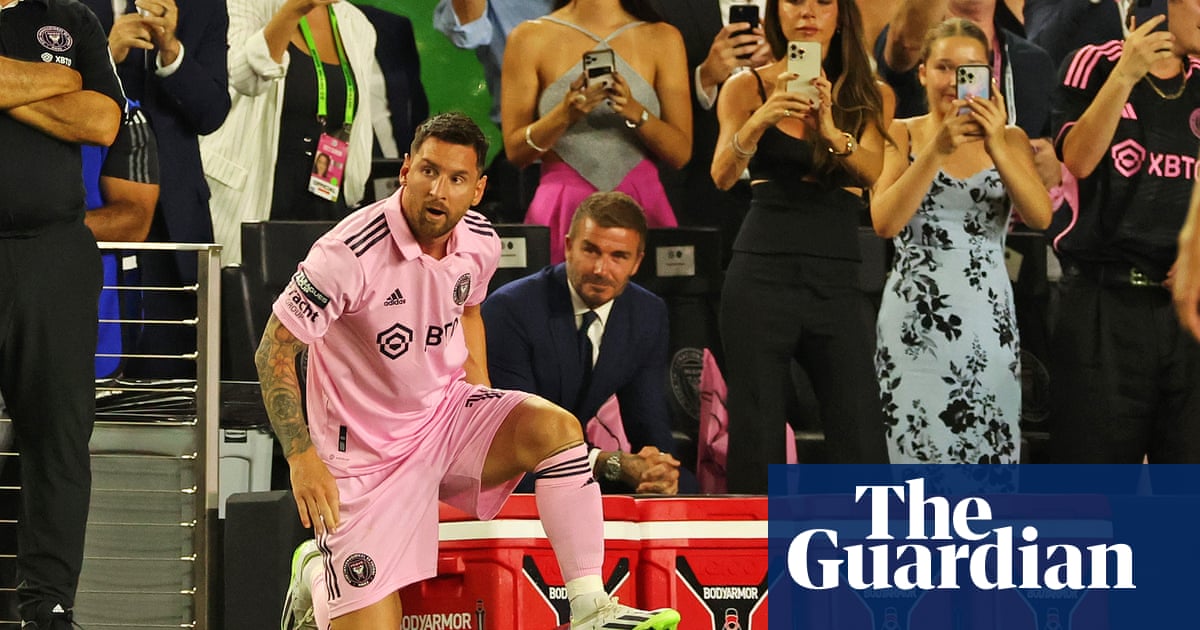
The sight of Formula One cars racing down Las Vegas Boulevard two months ago proved the power of streaming. More specifically, it highlighted the popularity of Drive To Survive, the Netflix docuseries that has transformed F1, particularly in the United States. November’s Las Vegas Grand Prix was attended by almost every celebrity and public figure with a Wikipedia page – and Major League Soccer was clearly watching.
MLS will be the subject of its own Drive To Survive-style show – produced by the same film-makers (Box To Box Films) – in 2024 with an eight-part series promising to offer “a definitive, never-before-seen insider’s view into the league.” MLS players and coaches can now look forward to becoming reality TV stars.
If done right, this could be just as big for MLS as the signing of Lionel Messi. The Argentinian’s arrival at Inter Miami last summer was a landmark moment for a league that has been open about its desire to become one of the world’s best. There were already going to be more eyes on MLS this year than ever before with Messi Mania taking hold across the US. The new series will provide another prism to view the league though.
Content is king in the modern age of sports and MLS has recognised this, both through its partnership with Box To Box Films and the record $2.5bn broadcast deal it struck with Apple TV. MLS, however, needs captivating, must-watch content to make the whole thing worthwhile. Its series must stand out in an increasingly crowded marketplace.
Every other sport is chasing the Drive To Survive effect. Box To Box Films has also made golf (Full Swing), cycling (Tour de France: Unchained) and tennis (Break Point) equivalents while Amazon’s All or Nothing franchise has followed Arsenal, Juventus, Manchester City and Tottenham Hotspur as well as the Brazilian and German national teams. And that’s just in soccer – it has also documented the Arizona Cardinals, Carolina Panthers, Dallas Cowboys, Los Angeles Rams, Philadelphia Eagles, Toronto Maple Leafs and All Blacks.
ESPN even produced a docuseries focusing on Los Angeles FC in 2019. However, We Are LAFC was so bland it was as if had been directed by a boardroom of marketing executives. The same could be said of the Messi Meets America show on Apple TV that was so dull it barely registered.
Only Welcome To Wrexham has truly come close to replicating the cultural impact of Drive To Survive. The storytelling and access gives the series following the Ryan Reynolds and Rob McElhenney-owned Welsh club an authenticity that portrays the likes of Paul Mullin and Ollie Palmer as personalities, not just players. That it focused on the club’s impact on the city and its people was as big a draw as the behind-the-scene glimpses.
Star power isn’t always needed to attract audiences. In fact, sometimes it is counterproductive when household names are too guarded for their genuine character to come across. The stars of Drive To Survive aren’t necessarily Max Verstappen or Lewis Hamilton, but Guenther Steiner and Daniel Ricciardo.
There will be the temptation to put Messi front and centre, such is the global fascination around the 36-year-old, but MLS might be wiser focusing on more unknown figures it can build its own narratives around. Messi has always given little away about his life off the pitch, and is unlikely to start doing so now. But there is no shortage of other interesting stories across MLS and the league’s Drive To Survive equivalent must tell them well.
The upcoming season will be filled with compelling storylines beneath the Miami veneer. How about tracking John Herdman’s bid to turn Toronto FC from an (expensive) laughingstock into a (slightly less) expensive contender? Or FC Cincinnati’s thriving, distinct soccer culture? Better yet would be providing an insight into the pipeline of young South American players joining the league.
This may prove impossible for a league notoriously nervous to acknowledge its own flaws. For decades, MLS has faced a fight for legitimacy in a world that hasn’t always taken the American game seriously. There’s a reason the league maintains such a highly polished front, but a warts-and-all docuseries can only be warts-and-all if viewers get to see the warts.
It’s possible players and coaches will have to get comfortable with the blurring of fact and fiction. While Drive To Survive has undeniably changed F1’s fortunes for the better, some drivers have complained that some storylines are exaggerated. Most notably, Verstappen refused to be interviewed for the show. “I’m quite a down-to-earth guy, and I just want it to be facts, don’t hype it up,” said the world champion, who was also a critic of the Las Vegas Grand Prix which he labelled “99% show and 1% sporting event.”
If, however, MLS is willing to do all these things and the concept is embraced, the impact of a Drive To Survive-style show could be profound. While it will probably never draw the same number of eyeballs as the original due to being on Apple TV (estimated 25 million subscribers) rather than Netflix (250 million subscribers), the storytelling could stoke the continued growth of the league.
The next few years are shaping up to be the most pivotal in American soccer for a generation. Messi plays in MLS. The 2026 World Cup will be played on home soil with the 2024 Copa America and 2025 Club World Cup also to be hosted by the US. None of this will matter, though, if measures aren’t taken to ensure this rise in interest counts for something meaningful in the long-term. One of those measures could be split into 60-minute episodes.












